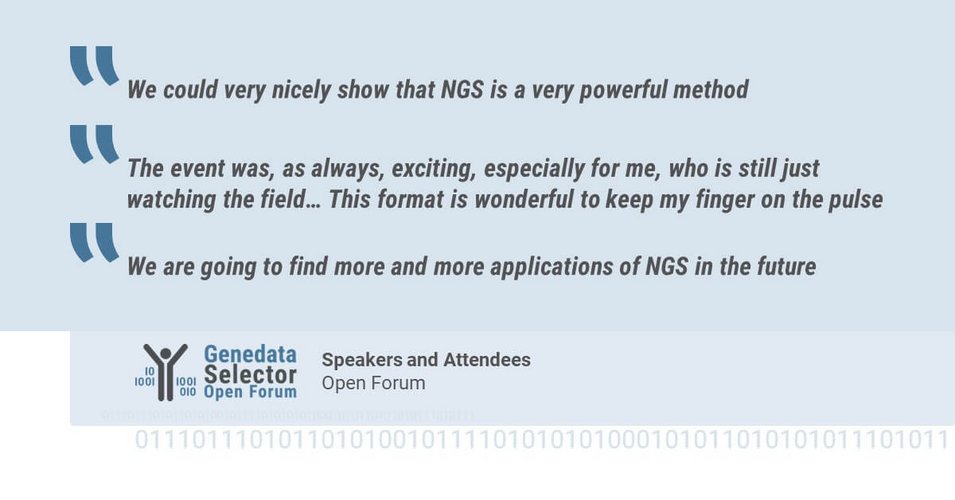Bristol Myers Squibb(BMS)社共催、Genedata Selector Biosafety Open Forum ~ 次世代シーケンス(NGS)を用いたバイオセーフティー試験に関する意見交換
February 8, 2022
Marie-Ange Kouassi
Next-Generation Sequencing (NGS) is revolutionizing the biopharma industry. When successfully adopted in research and development processes, it provides a vast number of applications and streamlines the biosafety assessment of therapeutic products. However, it can be difficult to know where to begin with the implementation, how to overcome the challenges of embracing new technology, or how to leverage the wide applications NGS offers. This is why the Genedata Selector team is committed to facilitating knowledge exchange in the biopharma industry on this topic. On the 27th of January 2022, Genedata held the fourth virtual open forum on NGS-Based Biosafety Testing co-hosted with Bristol Myers Squibb (BMS). The event featured presentations from experts on key topics such as biosafety testing strategy, regulatory practices, cell line, and product integrity confirmation as well as adventitious agent detection during vaccine development.
With a warm welcome from Anurag Khetan, Executive Director of Global Upstream and Cell Line Development at BMS, the event began with the motivation of BMS to pursue NGS-based viral detection and the importance of assessing the presence of contamination at specific stages during drug development. Anurag mentioned the potential of NGS to accelerate critical path timelines. Thomas Hartsch, the Head of Genedata Selector® also explained the importance of these discussions in supporting the widespread adoption of NGS in the biopharma industry.
The first presentation was given by Dheenadhayalan Veera, Director of Biosafety at AstraZeneca. He provided an overview of the biosafety testing strategy at AstraZeneca and shared practical advice regarding submission to regulatory authorities. Dheen explained that NGS is widely accepted and can substitute in-vitro and animal-based biosafety assays, however, it is fundamental to demonstrate that the assay is standardized and capable of broad-spectrum virus detection for the various components used (raw materials) and production systems. Some additional considerations highlighted by Dheen included risk mitigation and incident management documentation.
The event progressed to focus on viral risk assessment during the rapid development of a candidate COVID-19 vaccine presented by Vanessa Sarathay, Associate Principal Scientist, Cell Based Sciences at MSD Research Laboratories. While presenting this R&D project, Vanessa highlighted the different stages of the development process where there is risk of viral contamination and emphasized the importance of assessing the presence of adventitious agents. Vanessa gave an in-depth presentation of spike-in studies performed to confirm the sensitivity, specificity, and broad detection of viruses using high-throughput sequencing (HTS). HTS proved to be exceptional in all these aspects and gave valuable insight into methods of challenge resolution during vaccine development. Vanessa’s presentation concluded with a step-by-step walkthrough of the bioinformatics analysis performed to convert the data into insights that guided the decision-making process.

On the theme of bioinformatics analysis, Devon Ryan, Scientific Consultant at Genedata followed the previous presentation with a demonstration showing how to perform comprehensive biosafety assessments with Genedata Selector. He focused on product integrity testing (quality control) of viral vector vaccines and the importance of performing genetic characterization to ensure the development of a high-quality, stable, desired product. The audience had the opportunity to view how the ready-to-use workflows in Genedata Selector simplify the analysis of NGS data for automated reporting and efficient processes.
The final presentation by Simon Fischer, Senior Principal Scientist & Head of Cell Biology- Cell Line Development at Boehringer Ingelheim (BI) was an omics-assisted cell line characterization use case. Simon’s presentation highlighted the various useful applications of NGS for troubleshooting during cell line development for recombinant protein production. This project explored the underlying cause of differences in CHO cell phenotypes by exploring changes on a genomic and transcriptomic level. These findings were then validated through functional experiments such as CRISPR-mediated knockout experiments and FACS. If you are interested in finding out more, read the publication together with Genedata on this project.
The open forum concluded with a panel discussion where each speaker shared their perspective on future NGS applications. The panel kickstarted with a powerful introduction from Laurence Thompson, Senior Principal Scientist, Medicinal Sciences & Biotherapeutics Analytical R&D at Pfizer followed by the other speakers who gave presentations earlier. It was clear all speakers had high expectations for the promise of NGS in supporting the development of new therapeutics such as cell and gene therapy. With questions from the audience, each speaker shared their experiences making the event highly informative and interactive. In future, we will continue to facilitate and moderate these discussions by hosting open forum events alternating between Biosafety and Cell Line Development. Sign up to guarantee your place at the next event.
